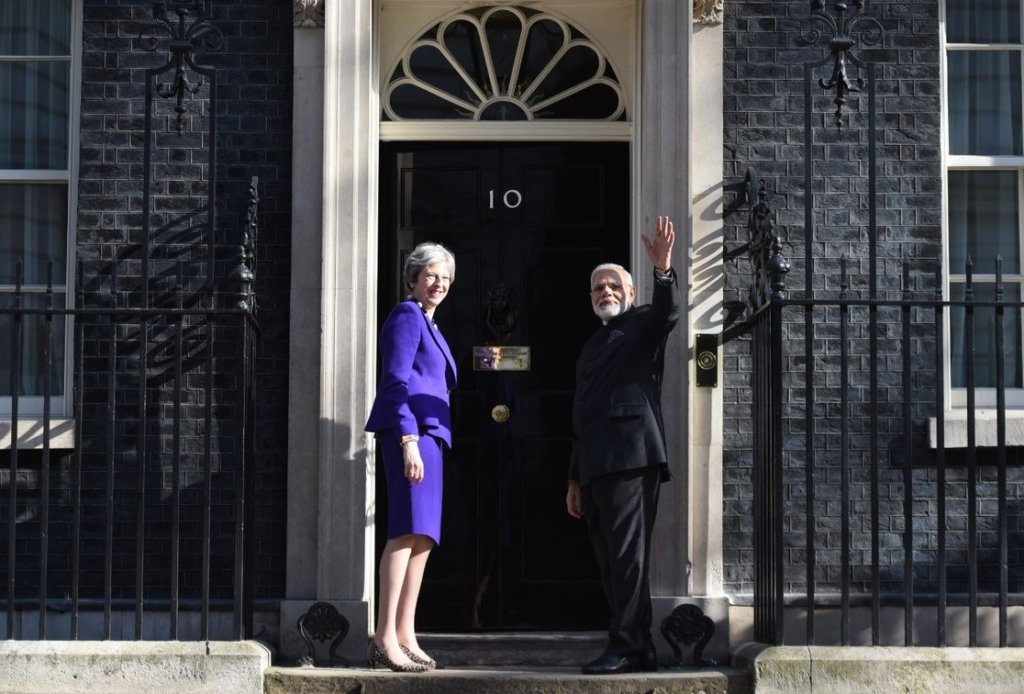After signing off his visit of Sweden with a speech to the Indian diaspora residing there, Indian Prime Minister Narendra Modi arrived in the United Kingdom late on April 17 for the Commonwealth Heads of Government meeting (CHOGM). His day on April 18 began with meeting UK Prime Minister Theresa May at 10 Downing Street, where they discussed over breakfast a wide range of issues, including cross-border terrorism, visas and immigration.
India and the United Kingdom are expected to sign a dozen agreements across various sectors, NDTV reported. After meeting May, Modi met with Prince Charles at the Science Museum in London. The event, hosted by Prince Charles, featured their interaction with Indian-origin scientists and innovators based in Britain. It also included the launch of the Ayurveda Center of Excellence, a global network of evidence-based research on yoga and Ayurveda, set up by the University of Westminster.
Modi is also scheduled to address the Indian diaspora in an event called “Bharat Ki Baat,” which around 1,700 people are expected to attend.
The Commonwealth Heads of Government meeting is scheduled to take place on April 19 and 20.
Meanwhile, after facing a barrage of criticism over immigration rules concerning citizens from Commonwealth countries who migrated to the United Kingdom after the Second World War, May on April 17 apologized for the harsh treatment they received at the hands of immigration officials, the Hindustan Times reported.
The individuals, who arrived in the country in 1948 with their parents and who have lived and worked in the UK for decades, were told that they could be detained or deported as they did not have documents to support their indefinite stay.
According to immigration rules put in force back then, people from the Caribbean countries, India and other Commonwealth countries who came before 1973 were entitled to stay permanently.
There are nearly 57,000 such people in the UK who arrived before 1973, of which 13,000 are from India, as per the Oxford Migration Observatory.
While reports have mostly talked of the Caribbean cases, campaign group Joint Council for Welfare of Immigrants observed that it is coming across cases on a daily basis of citizens born in Australia, Nigeria, Canada, South Africa, India and Pakistan “facing the same problem.”
May said on April 17: “I take this issue very seriously. The home secretary apologized in the House of Commons yesterday for any anxiety caused. And I want to apologize to you today. Because we are genuinely sorry for any anxiety that has been caused.”
She added: “Those who arrived from the Caribbean before 1973 and lived here permanently, without significant periods of time away in the last 30 years, have the right to remain in the UK, as do the vast majority of long-term residents who arrived later. I don’t want anybody to be in any doubt about their right to remain here in the UK.”
Home Secretary Amber also apologized to residents of what is called the Windrush generation — named after the MV Empire Windrush ship they came aboard — for the “wrong treatment” meted out to them, and subsequently blamed the Home Office for being “too concerned with policy.”
The controversy is surrounding the fact that when May served as Home Secretary, the UK government removed a key protection from the statute books for Windrush citizens.
As per the Home Office, the clause was not included in the 2014 Immigration Act because adequate protections were already in place for people who were initially granted temporary rights to remain in the United Kingdom and have stayed for decades. The move faced much criticism from opposition, as the clause was necessary to ensure that all longstanding Commonwealth residents are protected from enforced removal, and not just those who have gained “settled” status, the Guardian reported.
